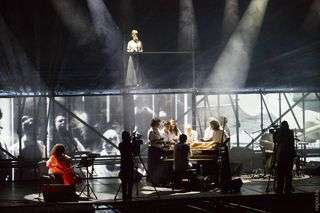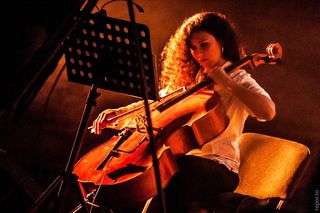|
Back
When Human’s Make Heaven And Hell New York
HERE Arts Center
01/15/2018 - & January 16*, 18, 19, 20, 2018
Roman Grygoriv and Illia Razumeiko: IYOV (American Premiere)
Marina Celander (Actor), Mariana Holovko, Ruslan Kirsh, Andrii Koshman, Hanna Marych, Yevhen Rakhmanin, Olekandra Turyanska (Singers)
Zhanna Marchinska, Andrii Nadolskyi, Illia Razumeiko (Instrumentalists), Roman Grygoriv (Conductor)
Vladyslav Troitskyi (Director), Mariia Volkova (Live Video Mixer), Nataliya Perchyshena (Lighting designer), Caley Monahon-Ward (Sound Engineer)
Created in 2015 at the order of the festival of contemporary art, GogolFest. Made possible by the Trust for Mutual Understanding. Produced with NOVA Opera. A production of Prototype

M. Celander and ensemble (© Vasyl Osadchyi)
In the year 2018, the real question about the Book of Job is not about God and evil. It’s about why–in our secular non-believing world–anybody should find enlightenment in the Book of Job itself.
The answer from this all-too metaphysical, all-too physical, inspiring, madly syncretic production from a Ukrainian ensemble is to reflect the words of God Herself. Don’t ask “why” things happen the way they do. Simply have faith that the musicians, singers, visual artists and–above all–the two composers have created such a magical experience.
Not necessarily magical in a good way. The huge screen to the back of the stage give us whirlwinds and tempests, monstrous idols, unending torrents of rain and the blood-red colors of Hades itself. The music–one cello, one drummer and one infinitely-voiced piano–give us equally Apocalyptic sounds, while the singers vary from deep-Russian Orthodox bass (and the minor-second choral singing of 16th Century Russian Church music itself) to by Baez and Byzantine.
Before that, composers Roman Grygoriv and Illia Razumeiko give us a multi-tiered, always mesmeric, non-linear picture of Biblical times as re-created by 2018 technology.

I. Razumeiko/R. Grygoriv (© Nastya Telikova)
Their production begins simply enough. The single notes of a minor triad repeated over and over again on the “harpsichord” sound of their prepared piano. On stage come six singers. Above them on a huge pedestal is the actor-narrator (played with dramatic authority by Marina Celander). She begins speaking from the Book of Job as one of the composers repeats those innocent single notes.
Ms. Celander reaches the part where Job begins his suffering, and so commences frenzied orgasmic forte fortissimo music from the piano bass, Satanic squalls on the screen, screams from the chorus and those all-enveloping red lights – starting 70 minutes of terror.
What follows would have turned the Children of Israel into bawling babies. But in IYOV (the Ukrainian name for Job), the children of the stage can handle the proceedings in stellar form.
The lights and projections, created by video and light designers Mariia Volkova and Nataliya Perchyshena, alter with virtually visionary progress change, enlarging the hands and faces of the musicians, or sending abstract columns of light. No, neither Satan (who in the Book of Job is a serpent) nor God are shown. But when we have a whirlwind, God does speak–in the calming voice of Ms. Celander.
If the video, lights and designs are typical for the productions of Prototype, the music here is what makes this such a splendid show. The changes on the piano are infinite, as played by the two composers. Both inside and outside the piano box. The sounds can be cymbalic or Baroque, resonant or dry. The styles are equally infinite. The choruses–amplified both by mouth-mikes or more resounding effects–take many forms. Much sounds like the Penderecki Passion, including quarter-tones and sudden alterations to Medieval harmonies. To a galumphing waltz, they sing serious melodies. To a Ravel-style Boléro tempo, one is swung not into Spanish themes, but a tempo belied by dissonant melodies.
The soloists listed above (not, alas, for each nunber) have a vocal purity which can edge into pop-vocalizations. Or, in the case of the bass singer, we hear the sounds of the Russian Orthodox Metropolitan during an Easter service.
Behind a glass cage reminiscent of Adolf Eichmann at his trial, is percussionist Andrii Nadolskyi, yet with all the motions on stage, one rarely pays attention.

Z. Marchinska (© Vasyil Osadchyi)
On the other side of the stage, cellist Zhanna Marchinska is unassuming at first. Not exactly basso continuo, but restrained before the piano and chorus. Her own solo, though, is lengthy, reaching upward, a kind of interlude.
The linguistic foundations for IYOV are twofold: first from that weird Old Testament book. Second, from the Catholic Mass. While the Hebraic and Islamic Job are basically the same character, the prosperous man who loses everything except his faith in the Lord, I have never been cognizant of Job within the Catholic or Orthodox faith. But this makes no difference to an opera whose effects are equal to anything which God could conceive.
True, I wasn’t convinced with the finale chorale, with its singers coming to the audience lightly tapping hand-held cymbals. It smacked too much like the finale of Bernstein’s Mass, the first so self-consciously syncretic musical work.
If that ending is pat, too much part of the “happy ending” in the original Book of Job, so be it. Amen. Yea verily. In fact, at a certain point during this wondrous evening, I mused how Bach, Scriabin, Palestrina, Schoenberg and all the visionaries up in Paradise must have regretted not living in 2018, when their own visionary esthesis might have materialized.
Never mind. We still have IYOV for a few days more. Seventy minutes may be too short for such man-made transcendence, but the Eternal Verities can take care of themselves.
Harry Rolnick
|